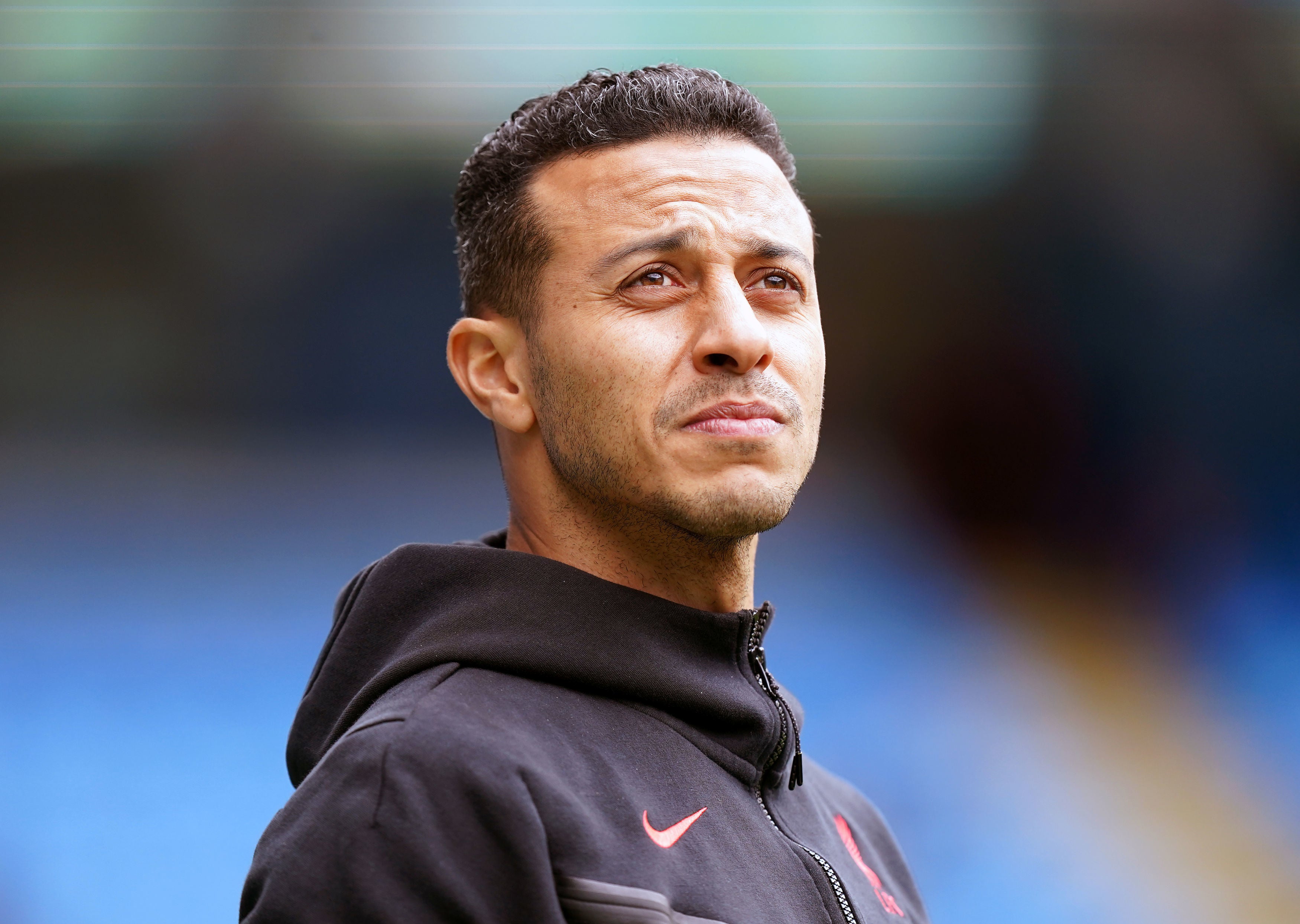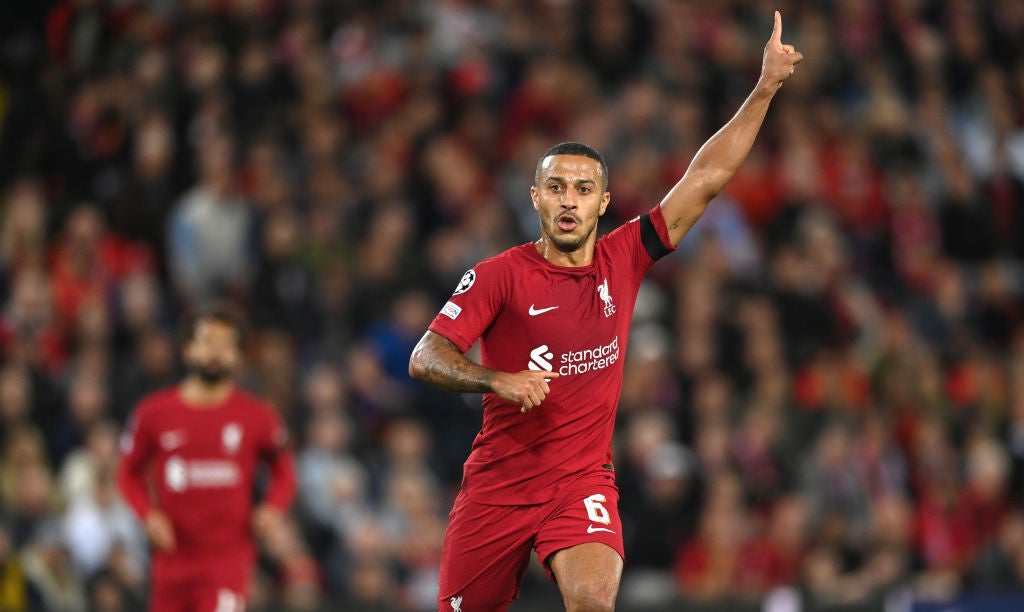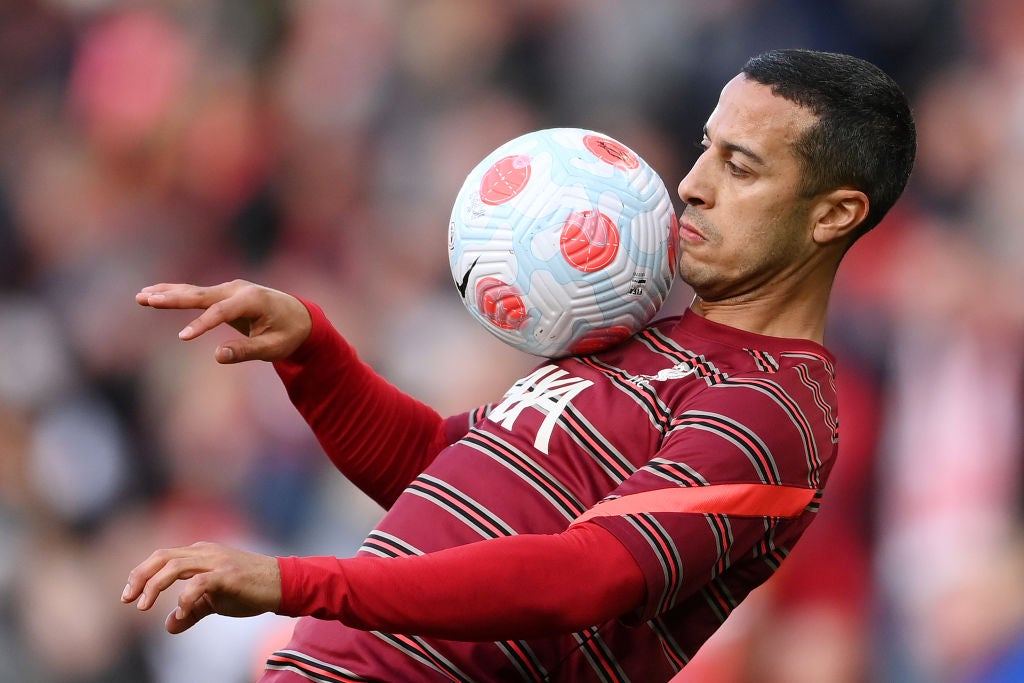Thiago Alcantara almost made Liverpool immortal – but leaves as a rare transfer failure
The Reds’ midfielder was a star at Bayern Munich but injuries have limited his Anfield impact

Your support helps us to tell the story
From reproductive rights to climate change to Big Tech, The Independent is on the ground when the story is developing. Whether it's investigating the financials of Elon Musk's pro-Trump PAC or producing our latest documentary, 'The A Word', which shines a light on the American women fighting for reproductive rights, we know how important it is to parse out the facts from the messaging.
At such a critical moment in US history, we need reporters on the ground. Your donation allows us to keep sending journalists to speak to both sides of the story.
The Independent is trusted by Americans across the entire political spectrum. And unlike many other quality news outlets, we choose not to lock Americans out of our reporting and analysis with paywalls. We believe quality journalism should be available to everyone, paid for by those who can afford it.
Your support makes all the difference.Not all departures from Anfield this summer will come with fanfare. If one long goodbye is being conducted in public, another is occurring in the shadows. Jurgen Klopp will depart on Sunday and, quietly, Thiago Alcantara will follow.
Thiago’s final campaign has yielded five minutes on the pitch, and even that came in defeat.
He was Pep Guardiola’s first signing at Bayern Munich, and Guardiola lends a comparison, given that his first recruit for Manchester City was Ilkay Gundogan, another midfielder with a silken touch who crossed the divide by playing for both Guardiola and Klopp. They felt like kindred spirits: multilingual, highly intelligent, oozing enviable levels of class.

Yet their fortunes have rarely been as divergent: Gundogan left City as the treble-winning captain and the talisman, having adapted his game to add goals. He was lured away by Thiago’s first club, Barcelona.
Thiago? He will go with a typically effusive tribute from Klopp but the reality is that his contract is up and, whereas Guardiola was desperate to keep Gundogan, there were rather fewer reasons for Liverpool to grant an extension.
He is the flagship signing who became the afterthought. “Liverpool 2.0” reflected Klopp’s sense that a new midfield meant a new team. And yet, in theory, there was one supposed constant. Yet Thiago has been ever-present on the treatment table, not the pitch.
A change of thought, tactics and personnel began even before the summer arrivals of Dominik Szoboszlai, Alexis Mac Allister, Wataru Endo and Ryan Gravenberch, before Jordan Henderson and Fabinho joined James Milner, Naby Keita and Alex Oxlade-Chamberlain in leaving – unlike his sidekicks, Thiago never received an offer from Saudi Arabia.
That came last April, as Trent Alexander-Arnold began to move into a hybrid midfield role and as Liverpool started winning. The renaissance of Curtis Jones started with Thiago on the bench. The shift to the future had begun.
The eventual verdict on Thiago may be that, signed for £30m and almost certainly departing for free, with one good season out of four, he represented a rare failure in the transfer market in the Klopp era. The alternative perspective is that he was two games from greatness, from being the player able to add another dimension to the team who won the lot.

Thiago graced the side who, in winning both domestic cups while being runner-up in the Premier League and the Champions League, almost won the quadruple. Yet he was below his best in the 2022 Champions League final, hampered by the injury that rendered him a doubt. He had missed the Carabao Cup final, hurt in the warm-up. His body was not made for the rigours of Kloppball. By the end of this season, he will have started one-third of league games in his time at Anfield.
His injury record added risk to his arrival. His age, profile and style of play scarcely rendered him a classic Klopp recruit. His Liverpool tended to buy players on the up, not one of such stature – he was arguably man of the match in the Champions League final for Bayern Munich (they may note that Bayern’s supposed coup of signing Sadio Mane from Anfield a year later was scarcely the triumph they imagined either). “A player like Thiago – settled that much at Bayern – is usually pretty much out of reach for everyone,” Klopp said in 2020. He had a rarity value.
The Spaniard was the man designed to add refinement, to alter the model of Klopp’s midfield of three workhorses, to improve what was perhaps the best team in the world. To put it another way, he was the classical musician brought into a team who played heavy-metal football.
When it worked, it was glorious. He was magnificent in 2022’s 4-0 demolition of Manchester United. Soon after, Klopp reflected: “When Thiago is in the shape he is in now, he would play for any team in the world.” That season brought the best goal of the Champions League campaign, a superlative strike against Porto, and the sublime, no-look, backheeled assist for Mane against Wolves. Thiago was Liverpool’s best technician, an extraordinary talent.

But he could star in a slick, functioning outfit. When there were fault lines in the squad, he was an issue, even though the problems sometimes originated elsewhere. In 2020-21, Liverpool’s centre-back injuries meant first Fabinho and then Henderson were drafted into defence, often meaning Thiago’s introduction to life at Liverpool often came as a No 6, not his ideal role in a side with a soft underbelly. That he had two injuries in autumn and operated in a midfield lacking its usual ballast made it a difficult start.
In 2022-23, the travails of Klopp’s ageing, injury-hit, ever-changing midfield undermined the whole team. It underlined that he needed physicality, while the immobility of the thirtysomethings became a problem. Liverpool lost their compactness, their ability to close gaps. That was rarely Thiago’s strength.
It highlighted the choices Liverpool made in their gamble of buying him, a player of the same generation as Henderson and Georginio Wijnaldum. The rebuild could have begun earlier, with a younger, more durable player but Liverpool opted for Thiago’s unique qualities. It was a choice that was almost justified in 2022, but which they may have rued in 2023. Thiago started three of the worst games: Brentford, Brighton and Wolves, and the 3-0 at Molineux may forever remain the last game he began for Liverpool.
Now, as Mac Allister and Szoboszlai have allied excellence on the ball with more running power, as Endo has proved the thirty-something bought from the Bundesliga to prosper alongside them, Thiago has felt Anfield’s forgotten man.
Among all major buys of the last eight years, he has been the most uncharacteristic. A Guardiola player in a Klopp team, Thiago was brilliant for one year. But in the other three, Liverpool have had reasons to wonder if, seduced by his gifts, they erred in buying him.
Join our commenting forum
Join thought-provoking conversations, follow other Independent readers and see their replies
Comments